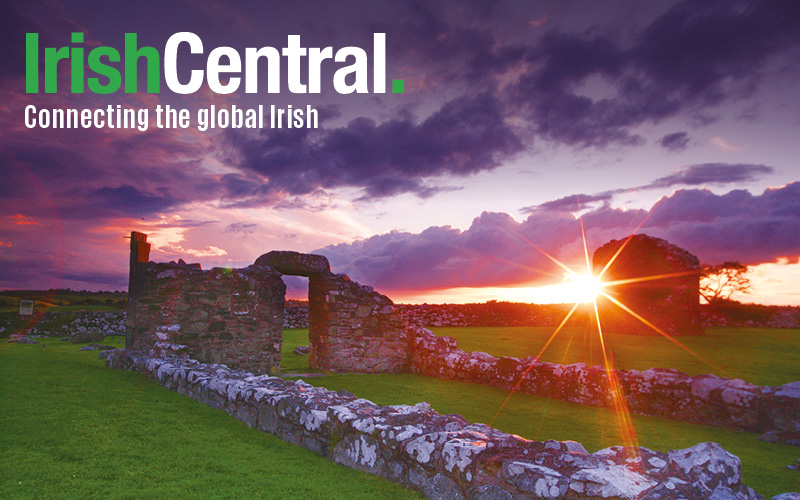| Iarla O'Lionáird |
Iarla O'Lionáird grew up and learned his craft in the musical heartland of Cúil Aodha in the West Cork Gaeltacht. He has established himself both as a masterful exponent of sean nos song, and as a pioneer in its renewal and development.
He is back with a new release, Foxlight, which continues his long and deep partnership with Peter Gabriel and the folks at Realworld Records.
Foxlight opens with “The Heart of the World,” an epic track that builds slowly and soon sweeps the landscape like a bald eagle in flight, helped with a repetitive riff similar to the one that propelled “Where the Streets Have No Name.”
His read of Turlough O'Carolan’s “Eleanor Plunkett” is introspective and gentle and like most tracks on the album, sung entirely in the Gaelic language.
The music is a delicate melange of earthy acoustic instruments with gentle electronica textures. In the center of it all is the beautiful instrument that is O'Lionáird’s voice. It has the purity of a sean nos singer with a contemporary flair of a modern folk player.
“I grew up speaking it and I’m emotionally attached to it as such,” O'Lionáird says when asked to explain why he sings in Gaelic.
“I am not a linguistic activist or anything like that. I just think it’s a beautiful language. The songs I choose to sing from the tradition I love, so I am emotionally attached.
“Plus, the words themselves mean so much for me. It’s important that I know what I’m singing instead of just the tones. Traditional tongue has been a great ally and our paths have co-evolved. It has been a companion to me.”
Foxlight has a dash of rare whimsy with “The Goat Song,” a children’s song he heard from his mother.
“I grew up in a hive of song and while my brothers and sisters sang, I knew I was something different and marked in some way. My parents made it all right for me to be this way,” he says of his West Cork upbringing.
“There were singers everywhere. The singing was marked in a certain way by the house you grew up in. You could close your eyes and know a person’s family by his way of singing. There was an intactness to the societal function of a song.”
A host of diverse musicians contribute to these songs. Composer Jon Hopkins, strings duo Geese, folktronica innovator Leafcutter John and fiddle and hardanger player Caoimhin O Raghallaigh helped provided the eclectic, epic sweep of the compositions.
Central to the album's inception was producer Leo Abrahams. O'Lionáird produced the last record himself, but this time around decided that "singing, writing and expressing" were his priority.
"This time, I've tried to just experience the voice. I wanted to reach new levels of expression,” he says.
Irish rock fans will remember the ground breaking records O'Lionáird made with the multi million selling Afro Celt Sound System which received two Grammy nominations. He has worked extensively with acclaimed Irish composer Donnacha Dennehy and the Crash Ensemble. This collaboration will culminate in May with an appearance with the Ensemble at Carnegie Hall this May.
O'Lionáird is whirlwind of activity, also being a member of the Ghost Trio, a new ensemble with uilleann piper Ivan Goff and fiddle player Cleek Schrey.
He is also the vocalist with the Gloaming, a new band featuring Martin Hayes, Caoimhin O Raghallaigh, Denis Cahill and Thomas Bartlett. They have recently recorded their debut album following a sell out tour of Ireland in 2011 that will be released later this year.
The current year will also see O'Lionáird begin work as composer of the soundtrack to a new film on James Joyce called Shem the Penman.
If he wasn’t busy enough, he is building on his MA in ethnomusicology from University of Limerick by finishing a Ph.D on “The Phenomenology of Distance and Connection” at the Irish World Academy.
I spoke with this busy and learned man about Foxlight, his many projects, and the fate of the Afro Celts. Here’s how it went:
To me, you’ve always made music that’s unclassifiable. How would you classify it as the composer?
It’s contemporary music. One of the goals I had was that the ear wouldn’t find it strange when put alongside some of the contemporary folk you would listen to. It’s folk, but something that is more immediate. Produced but not too dense.
It’s not as ambient as my last one and that was on purpose. I wanted this to be more direct.
To that point, let’s take “The Goat Song.” It seems like a children’s song in that it is very simple and straightforward but like a good Beatles song, it is simple and complex at the same time.
That is an old song. It is a children’s song insomuch as my mother taught it to me.
My producer really had to talk me into this one because while I like comedy, I’m far from what you would call a jolly composer. But Abrahams liked the simplicity of it because of this child-like directness.
In the end I liked this children’s song space in a way because children are direct and I think the songs here are direct. So it works.
This album was released on Real World Records, which is owned by Peter Gabriel. How would you describe this long association you’ve had with him?
First and foremost, he is a lovely man, very soft-spoken. We had a lot of great conversations about having a relationship with one’s own voice, a relationship to the sound, the subject matter, the microphone you’re singing into, and the relationship into your own life. I’m happy to say he has been a great supporter.
I am a huge fan of Afro Celt Sound System. What ever became of them and will we ever see them play again?
I left the band in 2011, so I don’t know what they’re up to now. We had a five-year hiatus and then we did some touring in Europe and the U.K. in support of a best of album that actually never made it to the states. I didn’t have the time to be in that group any longer. Plus, I thought it was very good and successful in its time, and I didn’t think it needed to be tested in these times.
The music I am interested now is less technologically dependent, and I think that’s a trend in music nowadays. Technology has become so compact and advanced that people can make music in their bedroom, and I think a more simple sound is coming from that in the music that I hear nowadays.
What other stuff are you working on?
The Gloaming, we’re playing in Lincoln Center outdoors in July. Martin Hayes and Denis Cahill are with me. More earthy and now. We just finished the record and it will be out in the summer.
I’m doing this Masters of Traditions tour, which is a presentation of traditional music. In May I’m with the Crash Ensemble at Carnegie Hall on a piece called “Gra Agus Bas.” It’s a 24-minute avant-garde opera, which I think is a record (laughs).
So, I guess that is where I sit now, somewhere between avant-garde classical avant-garde folk!
Pardon me for a crass question. You just said that you sing in a language most people don’t understand so it begs this question. Why are the words important to you?
It has been suggested to me that I just sing sounds with no words because it has the same feeling; people respond to the sounds and the emotion in my voice. But the emotion people connect because the words mean something to me.
I write about my life and that’s what listeners connect to even though they may not understand the words, is my guess.
Foxlight is available on Realworld Records. For more information, log onto http://www.iarla-o-lionaird.net.




Comments